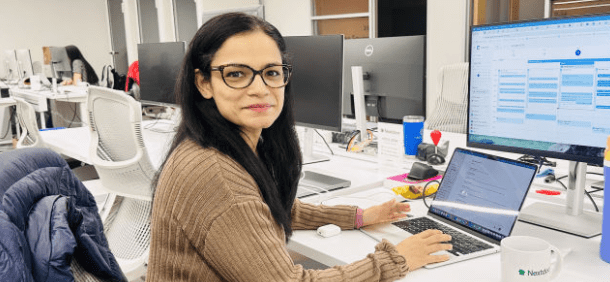In the age of intelligent transformation, the conversation around artificial intelligence has moved far beyond experimentation. The real challenge facing global enterprises today isn’t whether to adopt AI, it’s how to operationalize it responsibly, at scale, and in a way that amplifies human capability rather than replacing it.
At the center of this evolution is Shweta Puri, a judge for the Globee Awards for Leadership and an accomplished technologist and the Business Technology & AI Operations Lead at Nextdoor, who has made it her mission to turn AI from an aspirational concept into a practical advantage. With over a decade of experience bridging business strategy, AI integration, and marketing technology, Puri is redefining what it means to build an AI-enabled workforce.
“AI should not just be an add-on, it should be a layer that elevates every role,” she says. “The goal is to make every employee smarter, faster, and more confident in decision-making.”
From Experimentation to Enablement
When Puri began leading Nextdoor’s enterprise AI adoption, the company faced the same opportunities for efficiency seen across many modern organizations: knowledge silos, manual workflows, and an ever-growing volume of internal information. Instead of introducing smarter automations as a top-down mandate, she designed a rollout that began with a single, powerful premise – AI succeeds when people trust it.
Her first major milestone was the launch of Glean AI, an intelligent search and role-based agent platform deployed across Nextdoor’s go-to-market teams. Under her leadership, more than 500 employees gained access to AI-powered knowledge retrieval and automation tools customized to their workflows.
“Adoption is not about algorithms; it’s about empathy,” Puri explains. “You have to meet people where they are, show them the value, and make artificial intelligence feel intuitive, not intimidating.”
Engineering Trust in the Age of Automation
While many leaders focus on deploying intelligent systems, Puri emphasizes building trustworthy AI operations. At Nextdoor, she architected a governance framework that aligns with privacy, security, and compliance standards for a publicly traded global organization while ensuring the transparency of model decisions and data usage. Her work integrates ethical oversight directly into enterprise workflows, a proactive approach that balances innovation with accountability.
In parallel, she leads Martech strategy and execution, integrating platforms like Iterable and Segment with AI-driven automation. This unified infrastructure allows seamless coordination between Product, Legal, Finance, and Engineering, ensuring that every system powering customer engagement is both compliant and performance-optimized.
Her approach is what she calls “responsible acceleration” – enabling speed without sacrificing trust. “Ethics and scalability are not in opposition,” Puri notes. “They’re both prerequisites for sustainable AI growth.”
Creating Scalable Intelligence
One of the most remarkable aspects of Puri’s leadership is her ability to scale AI capabilities across diverse functions. By building modular, reusable frameworks, she has enabled different business units to customize AI automation workflows to their specific needs without reinventing the wheel. This adaptability has turned what began as a departmental pilot into an enterprise-wide ecosystem of AI-empowered teams.
“Every company wants to ‘do AI,’” she says. “But the real differentiator is how effectively you operationalize it. Success comes when AI becomes invisible, when it’s just how work gets done.”
Her framework now serves as a model for other organizations seeking to integrate AI across go-to-market functions, from marketing analytics and lifecycle automation to customer engagement and compliance management.
A judge at the Business Intelligence Group, Puri also contributes to the broader conversation on AI ethics and scalability through her academic work. Her published research, “Distributed AdTech Systems for Personalized Fashion Marketing” explores how distributed AI architectures can enhance personalization while preserving privacy, a theme that continues to guide her professional philosophy.
Her dual perspective as both practitioner and scholar allows her to bridge two worlds: enterprise execution and academic innovation. “Technology leadership today requires constant dialogue between what’s proven and what’s possible,” she says. “The next generation of leaders will need to speak both languages, strategy and science.”
The Human Edge in AI Transformation
For Puri, the future of enterprise AI is not about replacing human judgment, but augmenting it. Her vision is clear: organizations must evolve into learning systems, where AI automates the routine and humans focus on creativity, empathy, and strategy.
Under her leadership, Nextdoor’s teams have not only improved efficiency but also developed new ways of thinking about data, automation, and collaboration. “When people see AI as a teammate rather than a threat,” she explains, “that’s when transformation truly begins.”
As enterprises worldwide race to adopt AI responsibly, Shweta Puri stands out as a guiding voice for what sustainable, human-centered transformation looks like. Her work demonstrates that the future of productivity will not be measured in automation alone, but in how intelligently, inclusively, and ethically organizations empower their people through technology.
In a world where AI adoption often begins with pilots that never scale, Puri has shown what comes next: turning pilot projects into power users, and building a workforce where human insight and artificial intelligence grow stronger together.
Disclaimer: “The views expressed are Shweta Puri’s own and do not necessarily represent those of Nextdoor.”
For interviews or speaking engagements, contact [shwetapuri27@gmail.com / LinkedIn].



































